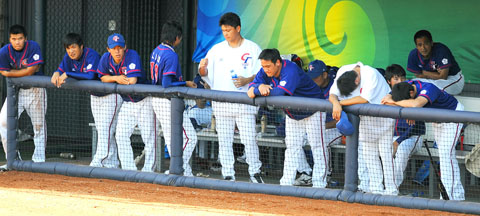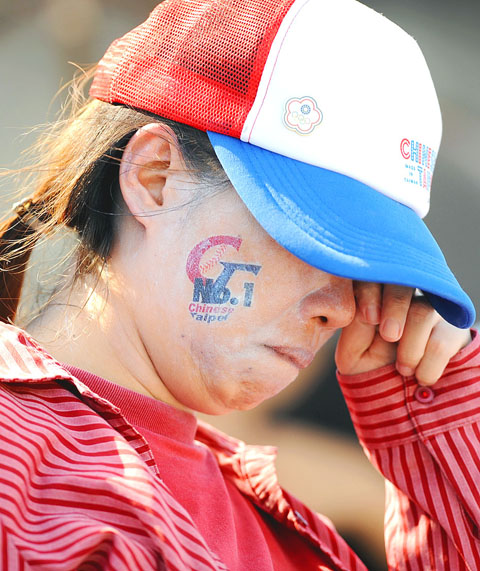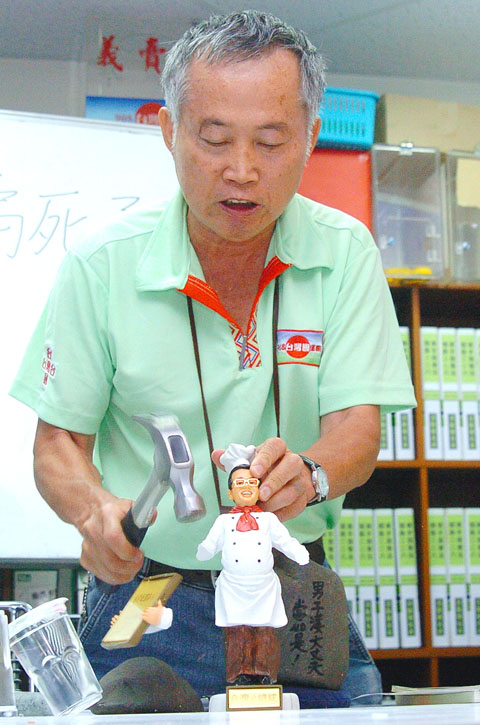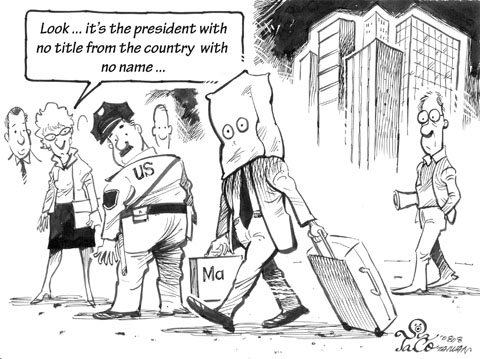Dalai Lama: China
mistreating Tibetans during Games
Sat Aug 16, 6:43 PM ET
PARIS (Reuters) - The Dalai Lama said on Saturday China was
mistreating and torturing civilians in Tibet while the Olympic Games were going
on.
ADVERTISEMENT
"Unfortunately the Olympic spirit is not being respected at all by Chinese
officials in Tibet," he said in an interview on France's TF1 television, when
asked if the tradition of an Olympic truce was being respected.
"There are restrictions on the circulation of information, very strong
censorship," he said.
"Civilians are often arrested, violently tortured to the point where they die.
It's really very, very sad," he said.
The Dalai Lama is on a two-week visit to France, mostly focused on religious
commitments. He has made few political comments but he criticized China's
actions in Tibet at a meeting on Wednesday with French legislators.
The visit has triggered a domestic row in France, where critics accuse President
Nicolas Sarkozy of caving into Chinese pressure by declining to meet him.
On Saturday he met Sarkozy's challenger in last year's presidential election,
Segolene Royal, who said she intended to visit Tibet.
Foreign activists have staged a number of protests in Beijing to highlight what
they say is repression of Tibetans in the Himalayan region but the Dalai Lama
has appealed to supporters not to disrupt the Games.
(Reporting by Sophie Louet; writing by
James Mackenzie; Editing by Jon Boyle)
Olympic games
mask PRC rights crisis
Taiwan News
2008-08-14 01:07 AM ,Page 6
The long-awaited Beijing Summer Olympic Games began with a
spectacular opening ceremony last Friday and fully reflected the drive by the
government of the People's Republic of China to use the games to display the
achievements of 30 years of "reform and openness" and announce its desire to
return to a core position in the world stage similar to that enjoyed by the past
Sinitic Han and Tang dynastic states.
Indeed, the procession of global leaders to meet with PRC State Chairman and
ruling Chinese Communist Party General Secretary Hu Jintao seemed reminiscent of
similar processions of the leaders of tributary states to past emperors.
Unfortunately, while the self-appointed PRC political elite is basking in the
reflected glory, it is all too obvious that most ordinary Chinese citizens were
not invited to the party.
Besides the thousands of households which have been displaced by the razing of
their homes for the construction of the "Bird Nest" stadium and other Olympic
facilities and the millions whom have had their lives and work disrupted for the
sake of the games, many Chinese who have worked and struggled to improve human
rights and achieve social justice or legal redress for their fellow PRC citizens
were also not welcome.
In the months before the Olympics began, PRC public security forces have
arrested or detained many human rights activists or dissidents and have driven
away many ordinary people who have come to Beijing from all over the PRC to
offer petitions to redress injustices or mistreatment at the hands of local
officials.
For example, human rights lawyers such as Gao Zhisheng and Chen Guangcheng and
Hu Jia and his activist spouse Zeng Jinyan did not see Friday's ceremony as they
were behind bars, even though they are the best people to represent the struggle
of Chinese people for a better life that underlaid the spirit of "reform and
openness."
Among the many rights activists and dissidents arrested in recent months, the
blind human rights activist and self-educated lawyer Chen Guangcheng stands out
as being named by "Time" magazine as one of the 100 most influential people
shaping the world in April 2006.
"China" may have "risen," but in fact the vast majority of the 1.3 billion
Chinese people remain underfoot and have not risen.
Indeed, the path to the lavish opening ceremony of the Beijing Olympics at the
"Bird Nest" was littered with a series of broken promises in the form of
commitments to improve human rights, news freedom, freedom of belief and
environmental made to the International Olympic Commission that allowed Beijing
to win the host rights in July 2001.
However, the fact that PRC has fulfilled virtually none of its promises has not
impeded world democratic leaders, such as United States President George W. Bush
and French President Nicholas Sarkozy, from eschewing calls by the global human
rights community to refrain from attending the lavish opening spectacle.
Instead, fearful of offending this rising military and economic powerhouse,
world leaders have have shown more enthusiasm to rush to Beijing to endorse the
authoritarian CCP regime than attending the 2004 Olympics in Greece, the
birthplace of democracy.
Taiwan's rightist Chinese Nationalist Party government has acted even more
cravenly.
Despite the election - eve declaration by President Ma Ying-jeou that he would
consider a boycott by the Taiwan team if Beijing continued to engage in
suppression in Tibet, Ma has scarcely mentioned Tibet since taking office May 20
and only issued a brief and vacuous statement on the 19th anniversary of the
Tiananmen Massacre of June 4, 1989.
Moreover, Ma evidently agreed to the high profile attendance in the opening
ceremony of both KMT honorary chairman Lien Chan and KMT Chairman Wu Po-hsiung,
who also shamefully endorsed the denigrating claim by PRC leaders that "China
Taipei" enjoyed a "home field advantage" of the PRC even though our "Chinese
Taipei" team cannot display the Republic of China national flag or have the ROC
national anthem played if a Taiwan athlete should win a gold medal.
Moreover, the surface courtesy shown to the KMT leaders cannot mask Beijing's
relentless and continuing campaign against Taiwan's own democracy and
possibility of self-determination or genuine international space.
We should recall that just three years after the Berlin Games, democratic
Czechoslovakia was annexed by Nazi Germany.
The declaration by Bush in Bangkok on the eve of the Beijing Olympics that
cooperation with the PRC had succeeded in "ensuring peace in the Taiwan Strait"
for the price of explicit opposition by Bush to "Taiwan independence" signals
that Taiwan may well be slated to be used as a bargaining chip to realize "peace
in our times" with a rising authoritarian power.
Only continued efforts by the world community in word and action to pressure
Beijing to fulfill its human rights commitments and clear demonstration of the
resolve of the 23 million Taiwan people to protect our democracy and autonomy
can prevent the Beijing Olympics from following the example of the Berlin Games
and becoming the prelude to a strengthening of authoritarianism in China and
sentencing Taiwan to becoming another Czechoslovakia.
No bid for
full UN membership
PROBLEM: Ma Ying-jeou said the failure of the UN referendums had left the
country with less room to strive for UN membership from a legal perspective
By Jenny W. Hsu and Shih Hsiu-Chuan
STAFF REPORTERS IN TAIPEI AND ASUNCION
Saturday, Aug 16, 2008, Page 1
“Our approach this year is based on the principles of pragmatism and
flexibility.” — Andrew Hsia, deputy foreign minister
Taiwan will seek “meaningful participation” in the 16 auxiliary agencies of the
UN and forgo the quest for full membership this year, the Ministry of Foreign
Affairs said yesterday.
“Our approach this year is based on the principles of pragmatism and flexibility
to meet the expectations of the public,” said Andrew Hsia (夏立言), deputy foreign
minister, adding that the tactic did not mean the government had given up on
seeking full membership in the future.
The text of the ministry’s proposal called for the General Assembly to consider
“the fundamental rights of the 23 million people of the Republic of China
(Taiwan) to participate meaningfully in the activities of the United Nations
specialized agencies.”
The proposal, cosponsored by 17 of Taiwan’s allies — but not the Vatican, Haiti,
Guatemala, Paraguay, Panama and the Dominican Republic — must first pass the
General Affairs Committee on Sept. 16 before going to the General Assembly.
Only three of Taiwan’s allies are on the 28-member committee.
“It is an extremely difficult task,” Hsia said, adding that Beijing was the
stumbling block in Taiwan’s bid to join international organizations.
“The ministry urges China to understand the expectations and will of the 23
million people of Taiwan and calls on Beijing to respond with goodwill and
flexibility,” he said.
“China claims it wants to win the hearts and minds of the Taiwanese people. What
could be a better way than to stop obstructing our UN bid?” he said.
Hsia said that the focus at this point was not what name the nation should use
to join the organization “because the name will not become an issue until the
international community has reached a consensus welcoming Taiwan into the fold.”
Hsia said major players such as the US and the EU had reacted “more positively”
this year than in previous years.
American Institute in Taiwan spokesman Thomas Hodges declined to comment on the
US’ reaction to the strategy except to repeat Washington’s policy that the US
does not support membership for Taiwan at international organizations that
require statehood, but supports meaningful participation in organizations where
full membership is not possible and organizations where statehood is not
required.
This year will be Taiwan’s 16th appeal to the UN since 1993 after it forfeited
its seat in 1971. Last year Taiwan’s bid sparked strong opposition from the US,
EU countries and other countries. The bid used the name “Taiwan.”
President Ma Ying-jeou (馬英九) said at a press conference in Paraguay that this
year’s strategy would help the public participate in the UN without harming the
nation’s diplomatic interests and cross-strait relations.
Ma said the government was handling the bid in a cautious manner in view of the
failure of the two referendums on the country’s membership in the UN earlier
this year.
He was referring to the fact that neither the Chinese Nationalist Party (KMT)-initiated
referendum on “rejoining” the UN under the name “Republic of China” or any other
practical title that would uphold the country’s dignity, nor the Democratic
Progressive Party-backed referendum on joining the UN using the name “Taiwan”
passed the voter threshold.
Ma said the government had three considerations in mind in determining the bid —
public opinion, the reality of the international community and the consequences
of the two failed UN referendums.
“Considering all the three factors, the UN proposal should be realistic and
flexible,” Ma said.
Ma said the failure of the UN referendums had left the country with less room to
strive for UN membership from a legal perspective.
The fact that the participation rate for both referendums was under 36 percent
meant that the people of Taiwan felt regret that they could not participate in
the UN but that the public at the same time did not consider adopting the
referendums urgent, Ma said.
Ma said the government must take the referendum results seriously as they have
symbolic meaning.
Also See: DPP’s caucus whip pans Ma over new
policy for UN
China stun
Taiwan with 8-7 win in extra innings
STAFF WRITER, WITH AGENCIES, BEIJING
Saturday, Aug 16, 2008, Page 1

Members of Taiwan’s Olympic baseball team
react after their defeat by China yesterday.
PHOTO: WANG YI-SUNG, TAIPEI TIMES
China, playing in their first Olympic baseball competition, upstaged Taiwan 8-7
yesterday in a game that went into extra innings and stopped work in Taipei as
incredulous fans watched events unfold on television.
After the game, Taiwanese coach Hung Yi-chung (洪一中) attended the press
conference alone, saying that the coaching team would take full responsibility.
“Loss is loss,” Hung said, adding that most players had performed well, but that
the relief pitcher had been too cautious.
With the overtime in the game against Japan, Hung had been worried that the team
wouldn’t get enough rest before the game against China. He asked to have the
match against China postponed, but the request was rejected.
One of the players, Shih Chih-wei (石志偉), said the team had not had enough rest
after Thursday night’s game, but that it was not an excuse for the defeat.
As for the new system of installing runners on the first and second bases in the
11th inning, Hung said that teams were unaccustomed to it and it is somewhat
unfair to the teams that bat first.

An upset member of Taiwan’s cheer squad
cries yesterday in Beijing after Taiwan’s baseball team lost to China.
PHOTO: WANG YI-SUNG, TAIPEI TIMES
“It’s just like in history,” said Mao Ai-fen, a government employee in Keelung.
“Last night we lost to [former colonial power] Japan and today we lost to the
communist bandits.”
A man surnamed Huang, 50, said as he watched the action on television in Taipei:
“They should all go jump in the sea. This is the end for the Taiwan team.”
In Beijing, fans from both sides waved plastic batons and cheered their teams
from different pockets of the crowd. They behaved respectfully, even cheering
for one another when catchable foul balls went into the stands.
The coach of China’s team, Jim Lefebvre, also attended the press conference with
three Chinese players, saying it was a significant victory for Chinese baseball.
Separately, former Taiwanese coach Lin Hua-wei (林華韋) said he had once predicted
China would eventually beat Taiwan in baseball, “but I didn’t really expect it
to happen right here, right now.”
Also See: Olympic STORIES
Tibet
activists hang sign on new CCTV building, deported
AP AND AFP, BEIJING
Saturday, Aug 16, 2008, Page 1
Five foreign activists were deported after they scaled a landmark
building in Beijing yesterday to unfurl a “Free Tibet” banner over an Olympics
billboard in the latest protest during the games.
Students for a Free Tibet said the protesters — three Americans, a Briton and a
Canadian — were detained by police after hanging the banner from the new
headquarters of state-owned China Central Television (CCTV), which is still
under construction and is notable for having a shape likened to a twisted “Z.”
Britain’s Sky News shot footage of the protest, showing the helmeted activists
draped in Tibetan nationalist flags and dangling from ropes as they hung the
black-and-white banner about 6m off the ground. Police quickly took the banner
down.
PROPAGANDA SYMBOL
The activists chose the CCTV building because it represents the government’s use
of state media to spread propaganda, spokesman Kurt Langer said.
“They’re trying to whitewash their human rights record and present a pretty
picture to the world when, in fact, behind the facade is an ugly reality and the
situation in Tibet is as bad as it’s been in a very long time,” Langer said by
phone.
The Beijing Public Security Bureau said in a faxed reply to questions that the
protesters had “engaged in activities that violated Chinese law.”
The group’s campaign director, Kate Woznow, confirmed the five activists were
deported yesterday.
It was the latest in a series of protests by activists who have sought to use
the Games to criticize China for rights abuses and religious restrictions.
Other foreign protesters have also been quickly deported.
The action came a day after the International Olympic Committee urged China to
allow foreign reporters at the games to report freely after a British journalist
trying to cover a protest said he was manhandled by police.
Activists have also complained that protest zones designated by Beijing
organizers were set up as a way to catch dissidents — not let them speak out.
At least one person who applied to hold a demonstration in one of three protest
parks was detained by police.
FAKE MINORITIES
Meanwhile, children from China’s dominant Han population represented Tibetan and
other ethnic groups in a key part of the Olympic opening ceremony, an official
said in comments published yesterday.
If confirmed, it would be the third faking incident of the ceremony, after it
was revealed a little girl was substituted as a singer because she was deemed
too ugly and fireworks on the TV broadcast were pre-recorded.
Fifty-six children carried out the Chinese flag in a moment meant to showcase
national harmony during the ceremony at the Bird’s Nest stadium. Organizers had
claimed one was from each official ethnic group in China, but they were in fact
all Han, an official with the dance troupe that the children belonged to told
the Asian Wall Street Journal.
“I assume they think the kids were very natural looking and nice,” the paper
quoted Yuan Zhifeng, deputy director of Galaxy Children’s Art Troupe, as saying.
Also See: Olympic STORIES
DPP’s caucus whip
pans Ma over new policy for UN
GOING LOCAL: Democratic Progressive Party
legislative whip Chang Hwa-kuan asked if the president wasn’t planning to
abolish the Ministry of Foreign Affairs altogether
STAFF WRITER, WITH CNA
Saturday, Aug 16, 2008, Page 3
“If we don’t even insist on our name, then we can’t be considered a
country. And if that’s the case, then we don’t need foreign relations.” — Chang
Hwa-kuan, DPP legislative whip
The Democratic Progressive Party (DPP) deputy legislative caucus whip
said yesterday that the government’s UN strategy had “broken the hearts of the
Taiwanese people.”
Pan Meng-an (潘孟安) was referring to this year’s UN bid submitted to the UN
Secretariat on Thursday by representatives of St. Vincent and the Grenadines and
the Solomon Islands, two of Taiwan’s diplomatic allies, at the request of the
Ministry of Foreign Affairs.
The proposal marks a fresh approach by the government in pushing for UN entry
for Taiwan since President Ma Ying-jeou (馬英九) assumed office on May 20.
The new proposal, submitted ahead of this year’s UN General Assembly meeting set
to open on Sept. 16, is significant in that it does not mention the name Taiwan
nor the entity of the Republic of China seeking to return to the world body.
The ministry said the proposal was based on the principles of “dignity,
pragmatism and flexibility.”
Pan said that Ma’s proposed “diplomatic truce” with China was hypocritical, a
sign of surrender and a downgrading of Taiwan’s status.
The proposal to the UN caters to “Ma’s stance of capitulation” and by omitting
the name Taiwan, does not demonstrate the Taiwanese resolve to join the
international community, Pan said.
Meanwhile, DPP legislative whip Chang Hwa-kuan (張花冠) said Taiwan’s sovereignty
should be insisted upon at all times, regardless of the international situation.
Saying that membership in the UN gives a country “legitimacy,” Chang asked how
the government can put forward a proposal that does not include the country’s
name.
“If we don’t even insist on our name, then we can’t be considered a country. And
if that’s the case, then we don’t need foreign relations,” he said, asking
whether the government was planning to abolish the Ministry of Foreign Affairs
and downgrade the government’s status to that of a local government.
DPP Legislator Chai Trong-rong (蔡同榮) said Ma’s recent downplaying of his status
as president during his transit stop in the US was aimed at catering to China’s
demands, adding that the president has acted like “he wants to be a model
student of Beijing.”
The UN bid is the same in that it is based on a desire to avoid angering
Beijing, Chai said, adding that the bid has “cheated the Taiwanese.”

Peter Wang, convener of the ‘‘908 Taiwan Nation Movement,’’ breaks a statue
of former president Chen Shui-bian at a press conference yesterday. Wang said he
was angry and disappointed with Chen for his inaccurate reporting of election
campaign funds and for the funds’ transfer to overseas bank accounts.
PHOTO: GEORGE TSORNG, TAIPEI TIMES
The hollow
promise of the next hegemon
By Chen Hsin-Chih 陳欣之
Saturday, Aug 16, 2008, Page 8
With China’s rapid rise in recent years capturing the world’s attention, the
Beijing Olympics have sharpened the focus of the international community on
China.
The scale of these Olympics is far greater than previous Games and will probably
be the most spectacular of them all. But whether China will be able to create an
image distinct from EU and US hegemony as it crosses the threshold from
developing to developed country lies at the heart of global concerns.
A look at US and UK hegemony in the 20th century shows that hegemonic countries
employ a carrot-and-stick approach consisting of military threats and systemic
controls while providing public wealth incentives such as security, stability
and economic and trade prospects.
The pessimistic view is that if China were to achieve its desired level of
hegemony, it would just be another version of the standard hegemon, or maybe
even more imperious than the UK and the US.
Regrettably, China has in recent years seemed to be wearing the false mask of an
outdated hegemon. The Chinese Communist Party thirsts for power in the same way
as the UK and the US, but in a manner more arrogant and overbearing. During the
Cold War, the US turned a blind eye to the autocracy of allies in the name of
anti-communism. The Chinese government today plays the same game by
unconditionally supporting the actions of pro-China countries such as Myanmar
and Sudan despite the risk of universal condemnation — so long as these
countries supply the raw materials China needs for economic development.
Although China speaks unreservedly of world peace and justice, it is behaving in
the same way as Western hegemons.
China is not an easily satisfied country. In the recent failed WTO Doha round,
China was for the first time invited to attend closed-door negotiations with the
US, the EU, Brazil, India, Japan and Australia. This represented a great leap in
China’s position on the international stage — officially becoming a core country
that decides on global political and economic development.
China has even worked with India to block US and EU interests. Although this
reflects the declining power of the US and the EU, it also shows that China’s
desire for power is hard to satisfy.
Chinese imperialism may look benevolent on the surface but it is hardly
inspirational. The core value remains the balance of power amid cycles of
economic stability claimed by Western hegemons; there is nothing new, therefore,
in China’s version of hegemony. But the cost of succumbing to Chinese domination
could involve shrinking political participation and declining human rights
protection.
Chinese imperialism might lead to affluence, but it will not bring dignity and
justice to the world. Nor will the rise of China bring a new vision to the
world; another wearying hegemon is all it will be.
China cannot deflect the complex feelings of surprise and fear toward it that
are emerging around the world. Its rise is merely another addition to the long
line of rising and falling hegemons.
The world is fed up with the aging American hegemony, and the dazzling
performances during the Olympics’ opening ceremony that stole the international
spotlight might point to a changing world.
However, after the Olympics are over, in the shadow of a global power struggle,
it is hard to see how China can bring hope to global development.
Chen Hsin-chih is an associate
professor of political science at National Cheng Kung University.
Translated by Ted Yang
